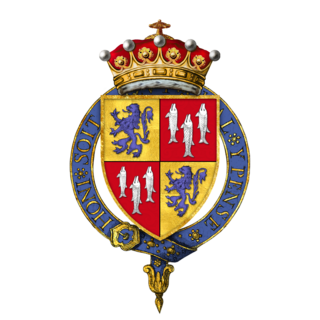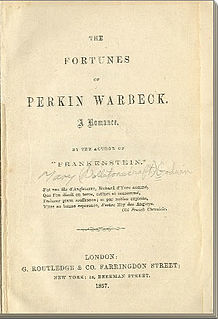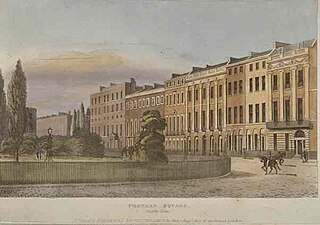
Sir Henry Percy, nicknamed Hotspur, was an English knight who fought in several campaigns against the Scots in the northern border and against the French during the Hundred Years' War. The nickname "Hotspur" was given to him by the Scots as a tribute to his speed in advance and readiness to attack. The heir to a leading noble family in northern England, Hotspur was one of the earliest and prime movers behind the deposition of King Richard II in favour of Henry Bolingbroke in 1399. He later fell out with the new regime and rebelled, being slain at the Battle of Shrewsbury in 1403 at the height of his fame.

Ralph Neville, 1st Earl of WestmorlandEarl Marshal, was an English nobleman of the House of Neville.

The Golden Treasury of English Songs and Lyrics is a popular anthology of English poetry, originally selected for publication by Francis Turner Palgrave in 1861. It was considerably revised, with input from Tennyson, about three decades later. Palgrave excluded all poems by poets then still alive.

The title of Earl of Northumberland has been created several times in the Peerage of England and of Great Britain, succeeding the title Earl of Northumbria. Its most famous holders are the House of Percy, who were the most powerful noble family in Northern England for much of the Middle Ages. The heirs of the Percys, via a female line, were ultimately made Duke of Northumberland in 1766, and continue to hold the earldom as a subsidiary title.

Henry Percy, 4th Earl of NorthumberlandKG was an English aristocrat during the Wars of the Roses. After losing his title when his father was killed fighting the Yorkists, he later regained his position. He led the rearguard of Richard III's army at the Battle of Bosworth, but failed to commit his troops. He was briefly imprisoned by Henry VII, but later restored to his position. A few years later he was murdered by citizens of York during a revolt against Henry VII's taxation.

Baron Leconfield, of Leconfield in the East Riding of the County of York, is a title in the Peerage of the United Kingdom. It was created in 1859 for Col. George Wyndham (1787–1869). He was the eldest illegitimate son and adopted heir of George Wyndham, 3rd Earl of Egremont (1751–1837), from whom he inherited Petworth House in Sussex, Egremont Castle and Cockermouth Castle in Cumbria and Leconfield Castle in Yorkshire, all formerly lands of Josceline Percy, 11th Earl of Northumberland (1644–1670), inherited by Charles Seymour, 6th Duke of Somerset (1662–1748) on his marriage to the Percy heiress Elizabeth Percy (1667–1722) and inherited as one of the co-heirs of his son Algernon Seymour, 7th Duke of Somerset, 1st Earl of Egremont (1684–1750) by the latter's nephew Sir Charles Wyndham, 4th Baronet (1710–1763) of Orchard Wyndham in Somerset, who inherited by special remainder the Earldom of Egremont. The 1st Baron's eldest son, the second Baron, represented West Sussex in the House of Commons as a Conservative. He was succeeded by his eldest son, the third Baron, who served as Lord Lieutenant of Sussex from 1917 to 1949. The latter's nephew, the sixth Baron, served as Private Secretary to Prime Minister Harold Macmillan from 1957 to 1963. In 1963, four years before he succeeded his father in the barony of Leconfield, the Egremont title held by his ancestors was revived when he was raised to the peerage as Baron Egremont, of Petworth in the County of Sussex. As of 2017 the titles are held by his son, the seventh Baron. Known as Max Egremont, he is a biographer and novelist.
The Oxford Book of English Verse, 1250–1900 is an anthology of English poetry, edited by Arthur Quiller-Couch, that had a very substantial influence on popular taste and perception of poetry for at least a generation. It was published by Oxford University Press in 1900; in its india-paper form it was carried widely around the British Empire and in war as a 'knapsack book'. It sold close to 500,000 copies in its first edition. In 1939, the editor revised it, deleting several poems that he regretted including and adding instead many poems published before 1901 as well as poems published up to 1918. The second edition is now available online.
These are Oxford poetry anthologies of English poetry, which select from a given period. See also The Oxford Book of Twentieth Century English Verse.

Thomas Percy, 7th Earl of Northumberland, 1st Baron Percy, KG, led the Rising of the North and was executed for treason. He was later beatified by the Catholic Church.

The House of Percy is an English noble family. They were one of the most powerful noble families in Northern England for much of the Middle Ages, known for their long rivalry with another powerful northern English family, the House of Neville.
The Lord Warden of the Marches was an office in the governments of Scotland and England. The holders were responsible for the security of the border between the two nations, and often took part in military action. They were also responsible, along with 'Conservators of the truce', for administering the special type of border law known as March law.

The Fortunes of Perkin Warbeck: A Romance is an 1830 historical novel by Mary Shelley about the life of Perkin Warbeck. The book takes a Yorkist point of view and proceeds from the conceit that Perkin Warbeck died in childhood and the supposed impostor was indeed Richard of Shrewsbury. Henry VII of England is repeatedly described as a "fiend" who hates Elizabeth of York, his wife and Richard's sister, and the future Henry VIII, mentioned only twice in the novel, is a vile youth who abuses dogs. Her preface establishes that records of the Tower of London, as well as the histories of Edward Hall, Raphael Holinshed, and Francis Bacon, the letters of Sir John Ramsay to Henry VII that are printed in the Appendix to John Pinkerton's History of Scotland establish this as fact. Each chapter opens with a quotation. The entire book is prefaced with a quotation in French by Georges Chastellain and Jean Molinet.

Portman Square is a garden square in Marylebone, central London, surrounded by elegant townhouses. It was specifically for private housing let on long leases having a ground rent by the Portman Estate, which owns the private communal gardens. It marks the western end of Wigmore Street, which connects it to Cavendish Square to the east.
Honouring individuals with burials and memorials in Westminster Abbey has a long tradition.
The 1902 Coronation Honours were announced on 26 June 1902, the date originally set for the coronation of King Edward VII. The coronation was postponed because the King had been taken ill two days before, but he ordered that the honours list should be published on that day anyway.
The 1869 Birthday Honours were appointments by Queen Victoria to various orders and honours to reward and highlight good works by citizens of the British Empire. The appointments were made to celebrate the official birthday of the Queen, and were published in The London Gazette on 2 June 4 June and 1 July 1869.
The 1873 Birthday Honours were appointments by Queen Victoria to various orders and honours to reward and highlight good works by citizens of the British Empire. The appointments were made to celebrate the official birthday of the Queen, and were published in The London Gazette on 24 May 1873.